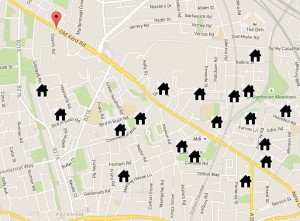Techniques which will maximize your business and fees
Managers and senior level professionals in the real estate business should spend a great deal of their time acquiring properties which to sell. The process is constant and the clients always want the lowest rates and the highest appraisal.
Unfortunately, more often than not a real estate executive will be told that their valuation of the property is too low and that the expected fees are too high.
By following the below formula, Estate Agents can present a more solid valuation to their potential clients, acquire properties which are worth the agencies resources (as marketing and advertisement of the property costs money), and maximize your profitability.
-
Know the local property Market
It may sound a bit redundant, but valuation of a potential property is most likely to be based upon the properties in the vicinity.
Where the overall market of a town or county may be in the 220s, a particular area may have homes that sell no more than 178k.
Simple research as to what properties actually sell for will provide you with a solid material to present to a potential client. Property portals such as Rightmove , Zoopla or Daft allow you to view recently sold properties or if you have an account with them they can provide you details of recent sale agreed.
It is a lot harder for a potential to claim that the valuation of the property is too low if you have the valuation of the nearby properties readily available.
The scope of your radius should be based upon the amount of properties within the area. The scarcer the homes are in a potential area the wider the radius needs to be.
-
Do not jump straight into evaluating the property
Even if a property is ideal, you do not want to let the potential client know that you are excited that they want to be your client. An overzealous estate agent may quickly find that their fees are being negotiated and that they are taking fewer profits.
Instead, when you arrive at the property introduce yourself and ask for a place to sit and discuss the procedures for your particular agency. This does a few things:
- It allows for the buyer and the client to take a step back and evaluate the realities of the potential client relationship.
- Should your procedures be beyond the expectations of the client, you can move on to another potential client without losing precious productivity time.
- By talking with the client prior to looking at the house, YOU keep the control
Think about this, an agent that visits a house and wants to immediately start looking at the house has flipped the roles of the real estate agent. The potential client will step in and start acting like a surrogate real estate agent in order to get you excited about representing the property.
In many cases they will show you the “best” qualities of a property with the hopes of raising the valuation of that property. Remember this rule listen 65% of the time and talk 35% of the time.
Be sure to use open ended questions while talking to your potential client such as “what key amenities do you see in your property which would help in the listing?”
Your mission in talking with the potential client is to ensure them that you are there to list the property, not to give an appraisal or for them to shop around. You want to seal the deal with the client. A great way to end a conversation would be to ask “When would you want me to list your property for you?”
Hawthorn Hill, Ballymaloe, Midleton, Cork
-
The preliminary price assessment
Once the procedures have been discussed you will need to present the vicinity information to the potential client. This should be done with tact. Do not simply push a brochure to the client and say “These are some other properties which have sold in the area”.
Instead, look directly at the client and state that “Where the properties in the local town have been selling in the 220s, this particular neighborhood has had a max selling cap of 178k for the past 3 years.”
When you present the vicinity price information to the client you want to ensure that you are looking directly at that person. The reason is that you are looking for indicators. When you mention the price does your client’s face show surprise, disappointment, or excitement?
A face that shows excitement means that the client has probably greatly underestimated the value of his/her property and is excited about the potential to make more than what they anticipated. Of course, if your client shows disappointment or disgust, then they have probably overestimated the property.
At this point, you are ready to take a tour of the home. However, before you begin your tour you need to ask your client what their asking price is of the home.
Most potential clients have a set price in mind as to what they will sell the property for. Assure your client that you will work to get a price that they are comfortable with. Reiterate the vicinity prices stating that it will serve as a guide when determining a price for their property.
-
Getting a tour from the vendor
The tour of the property is NOT for you to gain marketing pictures, take notes, or get the property ready for listing. You will do that all later. What you are looking to do is to get the potential client to agree with your assessment of the house.
Start at the top and work your way down. Each room should be addressed with comments such as “I love the natural lighting in this room”. Bring a measuring tape with you and measure smaller rooms.
Make comments which will assure your client that the property will sell. For example “This room would be a tight fit for a queen size bed, but it would be perfect for a kid’s room as they usually have full or twin size beds.” Again, you are looking for the potential client to agree with your comments.
Once you have toured the entire property including all connecting structures, garages, storage houses, etc., go back to where you first started. Ask again to sit down and talk with the potential client.
-
Setting a price for the property
You need to assure your client that you can sell the property. You should not be idealistic in your approach, but address the highlights and the negatives of the property.
It is best that when addressing the positives and the negatives of a property that you state the best qualities such as “I really think that the spaciousness of the master bathroom will be something that potential buyers will enjoy”.
Let the client tell you the negatives by asking “are there any negative attributes that you think would affect the listing price?”
When dealing with the negatives of the property, let your client know that not all clients will see the negative in a negative light. Be careful with these assurances as there are some negatives that are just negative.
For example you can state “Not all families require a two car garage, first time home buyers often like the smaller space of a single garage” but you should not state “I do not think that the roots from the oak tree in the back yard will affect the foundation of the garden house.”
Once all of the positives and negatives have been addressed, it is time to give your gut price. This is you best guess on what the listing price should be. For example: “Based upon what I have seen and from the vicinity averages, my gut is saying that your home can sell for 175k.
We will still need to have a plan of action before we put your house on the market, and we will work diligently to get your house sold for the price that is closest to your desired listing price”
-
Seal the deal and show the client your active database of buyers
One of the best ways to demonstrate your knowledge of the local property market is by knowing what budget buyers have for similar properties. If you have recently listed a property in this town you will have received emails and calls from buyers giving you a database of potential buyers to reach out to.
To demonstrate this to a vendor simply bring an IPAD or Tablet which is connected to your live database of buyers. You can upload the vendor’s property with the guide price and show all the matching buyers you have on your books.
If you tweak the valuation of the property you should get a varying amount of leads in your database depending on the buyer’s budget range. This shows the vendor that you can immediately begin to prospect potential leads to a viewing and help you win the new instruction.
So what other variables count
As you are a senior or an executive in the real estate business, you should know by now that the listing price is usually not the closing price. It is paramount that you relate this to your clients.
Tell your client “We have determined that you want to list your house for 175k. However, we need to discuss a few more details about the home.”
At this point explain to your client that usually there are one to two price drops offered on a property.
Your top price, or listing price, should not have a variable from the second drop price of more than 5k. You can present these drops to your client as what if variables. These questions can be:
- What if no one asks about your listing within the first 15 days?
- What if we get a great amount of lower bids, what would you be comfortable with?
From these two questions, you can generate three pricing options for the property. First, you will have the listing price.
If no one goes to see the property or asks about the listing then the price drops. This is the medium between the list price and the lower price. Since the margin will not be more than 5k, the drop will be 2.5k. Should the price reduction cause for a great deal of lower offers, the third and final drop can be given.
-
How much do you charge for selling the property
If you get to this point in your pitch, than the client wants your services (or at minimum is greatly considering your services). You should let your client know definitively what your fees will be.
Do not expect to get a great smile and quick acceptance. More than likely the client will state that a competitor offers lower fees. Here are some guidelines for presenting your fees:
- Offer a price amount and NOT a percentage. “I will sell your property for 3.5k” and not “I take a 1.5% fee from the sale of the property”
- If and when the client offers you the competitor’s rates, specifically state what you will do for their money (not your money or your fees.)
- Clearly break down what the Marketing budget fee will be spent on.
- Explain what other extras will be required such an Energy rating certificate and the cost.
When all questions have been addressed, then you are ready to seal the deal. As if there are any more questions and then ask “Are we ready to go to market?”
Considerations
You are trying to acquire a contract; therefore you should have
- The proper marketing and advertisement material available.
- Use digital and social media as well as other strategies to help with the listing.
- Bring an IPAD to the viewing and demonstrate your live database of leads.
- Do a video tour of the property if you have the equipment with you or outsource to a professional video company.
- If a client has objections about signing a contract then you need to think of creative but definitive ways to respond to any objections. Do not take no for an answer but do not be too zealous either.
Your professionalism will play a critical role in gaining your contract. By adhering to the steps above, you are more apt to have clients that are comfortable with signing a contract for your services.
By also addressing the vicinity properties, you can offer a higher listing and therefore collect greater fees.



